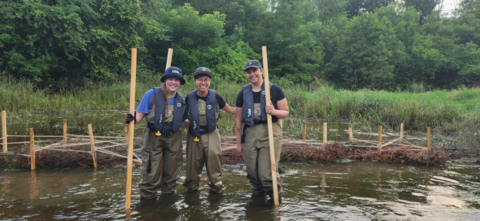Kelsey Leonard's Christmas Tree Lab works with farms to advance sustainability initiatives
This story by Chantal Vallis was originally posted by the Faculty of Environment.
Choosing a real Christmas tree is a cherished tradition in many families and a proven environmentally friendly choice. But like all agriculture sectors, Canadian Christmas tree farmers are facing the impacts of climate change on their growing operations.
Pests plague both the trees and farmers who work the land. Rising temperatures affect summer labour conditions, extreme storm events have triggered crop losses, and reduced snowfall in winter impacts families' experiences when selecting and bringing home their trees during the holiday season.
Alleviating these challenges is the reason why the Christmas Tree Lab was founded. Established in 2022, the lab is the first of its kind in Canada to conduct research on sustainability, climate change indicators and adaptive capacity in Christmas tree cultivation.
“Christmas tree farming is a large industry in Canada, with 418 Christmas tree farms in Ontario alone” says Dr. Kelsey Leonard, SERS professor and director of the lab. “In countries like the United States, there are research extension programs that support the farmers in making advances to address industry science priorities from pest management to soil amendments. The creation of this lab is one step in providing Canadian farmers with similar support.”
Earlier this year, the lab and the Christmas Tree Farmers of Ontario (CTFO) formalized their growing partnership. Their goal is to commit to joint research projects and outreach efforts aimed at developing sustainable initiatives to advance the resilience and growth of the Christmas tree industry.
Joint activities are well underway. The research team has already started documenting the experiences of Christmas tree farmers, and their findings have several practical applications. They are designing an ecological calendar for southern Ontario Christmas trees and starting Christmas tree recycling programs with additional partners like conservation authorities.
“It's exciting to have an Ontario university involved in Christmas tree farming research that’s specific to climate change,” says Alison McCrindle, vice-president on the CTFO’s board of directors.
“Going forward, the research will not only improve our industry, but will affect all sectors of agriculture,” says Shirley Brennan, CTFO’s executive director.
The new partnership with the lab and CTFO is the latest in Waterloo’s efforts to respond to the climate crisis with purpose-driven research and technology. For the past 50 years, the University has been a leader in sustainability research and education, and the Faculty of Environment has been a catalyst for environmental innovation, solutions and talent.
“By understanding farmers challenges and triumphs, we aim to develop practical solutions that will contribute to the resilience and sustainability of this unique industry” Leonard says.
Photo credit: Cedar Hill Christmas Tree Farm

From left to right are students Sophia Armstrong, Jess Wong, and Alison Clarke at the Conservation Halton stream restoration event on August 1, 2024 at Grindstone Creek. They installed recycled Christmas trees into the stream for sediment capture. The purpose of this activity is to build up and repair the bank of the stream to improve its flow. The trees are staked down with wooden posts and tied with string to ensure they stay there long enough to start to accumulate the sediment to further hold them in place.